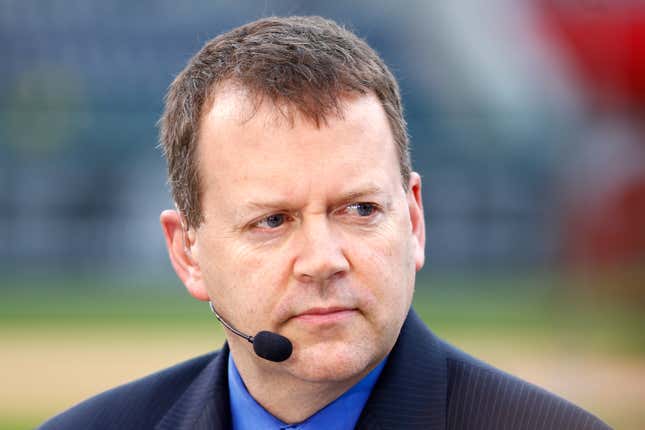
There are plenty of reasons to ignore Buster Olney, not only for the duration of the lockout, but beyond. ESPN’s baseball version of Adam Schefter is routinely a water carrier for some of the worst the sport has to offer, from caping for Zack Scott, to floating “ideas” that he then accidentally reveals are straight from management, to playing an absolutely brain-dead “both sides” angle on the eve of the lockout because some free agents got big contracts in the past week.
The really big reason: Olney doesn’t know what he’s talking about.
MLB is, in fact, the latest league to have a labor shutdown “since the advent of high-impact social media.” The NFL and NBA had lockouts in 2011, and the NHL lost half of the 2012-13 season to a lockout in which social media had a very “high impact.” During hockey’s lockout, federal mediator Guy Serota was removed from the proceedings after a tweet about “ass mode,” which made little sense as a meme then unless you were a Craig Ferguson fan, and seems barely comprehensible now, but it was definitely a thing. So was a parody account of an NHL podium.
It also should be noted that Olney’s false claim about social media is decidedly pro-management, as he wrote, “players will feel more direct backlash than ’94-’95, and it’ll be a challenge for union to keep a consistent message from all members.” Sure, the owners have an advantage in having fewer voices to keep in check, but it’s not like there aren’t loose cannons on the management side — hello, Steve Cohen! — or like billionaires can ever step out of line while thinking that they’re just saying something harmless.
There is, however, a notable first-of-the-era for this lockout. Major League Baseball is the first top sports league to impose a work stoppage since the COVID-19 pandemic. You may remember the COVID-19 pandemic as the reason that there was only a 60-game season in 2020, and the thing still killing hundreds of Americans every day and more than three-quarters of a million to date, more than the 2021 attendance of the Rays, A’s, and Marlins.
A big difference between before COVID and now? We learned during the pandemic that there are lots of things, baseball included, that we just don’t need. Sure, it’s nice to have a ballgame to watch, but we’ll be okay if next summer’s entertainment options are the WNBA, Netflix, and something called “going outside.” Baseball will come back eventually, and we’ll be happy when it does, but baseball no longer has a vise grip on American attention, and that’s only been shown more by the pandemic.
It’s freeing. We don’t have to do this. There are lots of other sports to care about, and other labor situations that the average person can and should care about much more than December and January being spent on a form of baseball discourse even more ponderous than Hall of Fame debates. Well, one less labor situation now, as the Kellogg’s strike appears to be coming to an end with a tentative deal reached Thursday… but one more, as BuzzFeed’s union is walking out today.
There are two ways that baseball’s lockout goes: either everyone realizes that there’s too much money in the game to sacrifice next spring and/or summer… or they go the NHL route and light themselves on fire. It’s telling that this lockout isn’t even seen as much to worry about, and that “the pressure won’t mount until mid-to-late January,” as Jayson Stark wrote. So, why should we bother to care now if they don’t?
That’s the real danger for baseball, where the stewards of the game are used to consumer fealty simply because summer means baseball. “Why should we care?” is not a question that MLB is accustomed to having to answer, and unlike when they came back in 1995 and struggled with fan anger, they now face a much bigger challenge to avoid fan apathy. They’re off to a dismal start.